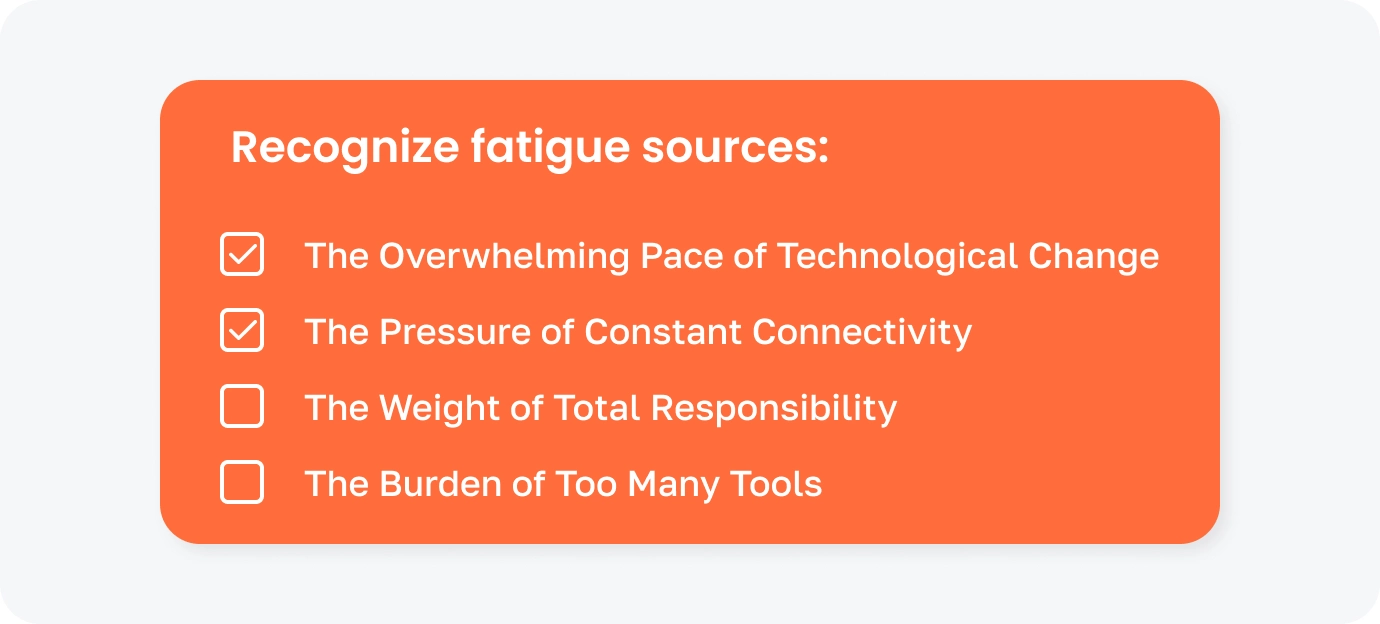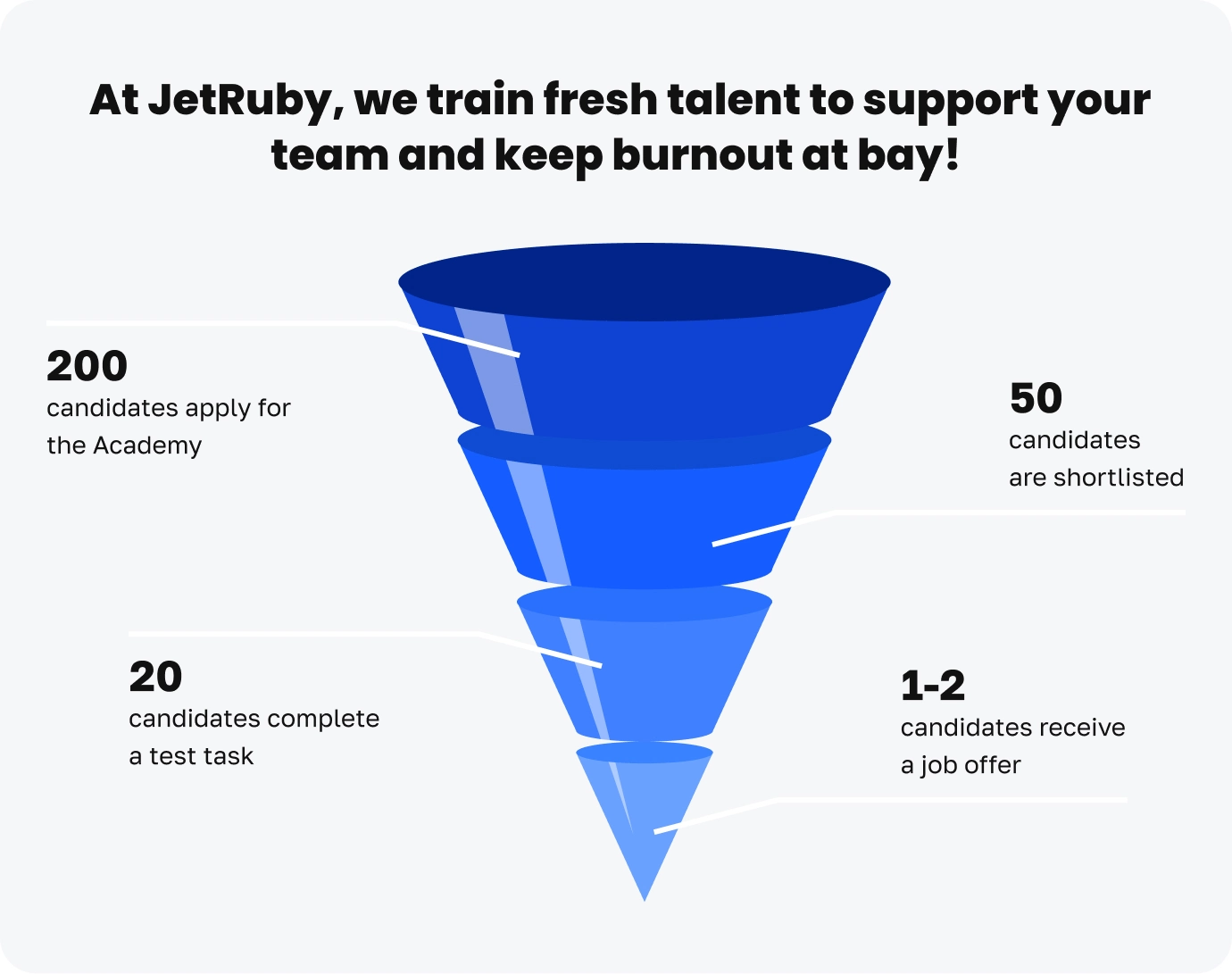Stay Sharp: Tackling Tech Fatigue in Ruby
Burned out by Ruby’s rapid changes? You’re not alone! Learn the causes of tech fatigue and how JetRuby’s Ruby Academy trains fresh talent combat burnout.

Table of Contents
Tech fatigue is a state of mental and emotional exhaustion that arises from the constant need to keep up with rapid technological advancements, and for Ruby developers working within a dynamic ecosystem, this pressure to stay updated often leads to burnout and frustration. This familiar feeling, known as developer fatigue, emerges when you stare at your IDE, fully aware that an external tool could save you time, yet lacking the energy to implement it due to the overwhelming mental load. Recognizing and understanding these sources of fatigue is quite important.
The Overwhelming Pace of Technological Change
The fast-paced tech landscape is exciting but relentless. New frameworks, libraries, and languages emerge almost weekly. The pressure to stay updated can be draining, leading to decision paralysis and burnout. The more options available, the harder it is to choose and feel confident about your decisions, contributing to fatigue.
The Pressure of Constant Connectivity
The expectation to always be available and deliver high-quality code blurs the line between work and personal life. This constant connectivity leads to exhaustion, especially in cultures where burnout is stigmatized, and productivity is expected around the clock.
The Weight of Total Responsibility
Today’s developers are expected to handle every stage of the software lifecycle, from ideation to maintenance. This wide range of responsibilities can dilute specialization and make it hard to keep up with every aspect, resulting in fatigue and overwhelmedness.
The Burden of Too Many Tools
Modern projects are often loaded with external dependencies — IDEs, cloud services, package managers, and more. Each tool introduces additional complexity, updates, and potential security risks, increasing cognitive load and stress.
Strategies to Combat Tech Fatigue
Prioritize Learning and Focus on Essentials
- Selective Learning
Instead of attempting to learn every new trend, focus on skills that align with your current projects or long-term goals. For example, if you’re maintaining a monolithic Rails application, prioritize learning about incremental updates to Rails rather than jumping into a microservices architecture unless it’s relevant. - Create a Learning Roadmap
Define what you need to learn and break it into manageable steps. This helps avoid feeling overwhelmed and allows for steady progress.
Break Down Learning into Manageable Chunks
- Micro-Learning Sessions
Engage in short, focused learning sessions instead of marathon study periods. Dedicating 30 minutes to a specific topic ensures consistent progress without overloading your mind. - Apply What You Learn
Implement new knowledge in real projects, even on a small scale. This reinforces learning and provides practical experience, making the knowledge stick.
Leverage the Ruby Community for Support and Guidance
The Ruby community is an invaluable resource for managing tech fatigue:
- Ask for Help
Participate in forums like Stack Overflow or the Ruby on Rails Discussions group to seek advice or solutions. - Attend Meetups and Conferences
Engaging with peers can provide insights into how others manage similar challenges. Events like RailsConf or RubyKaigi offer opportunities to learn and share experiences.
Example: A developer struggling with Rails upgrades might find comfort in discovering that others face the same challenges. Sharing solutions or learning from others’ experiences can significantly reduce feelings of isolation.
Refactor Legacy Code Gradually
- Tackle Small Sections
When dealing with legacy code, aim to refactor small parts rather than attempting a complete overhaul. This approach reduces stress and makes the process more manageable. - Address Tech Debt Incrementally
Prioritize tech debt based on its impact and gradually refactor problematic areas, ensuring you don’t disrupt the workflow or overwhelm yourself.
Tip: Use tools like rubocop to identify code issues and improve your application.
Integrating Security and Maintenance into Your Workflow
- Automate Where Possible
Use automation tools to handle routine tasks such as dependency updates (dependabot) or vulnerability checks (bundler-audit). This frees up time for more critical tasks and reduces the burden of manual checks. - Adopt CI/CD Practices
Incorporating continuous integration and deployment practices helps catch issues early and reduces the stress of manual testing or deployment processes.
Adopt Mindful Technology Use.
- Take Breaks
Incorporate regular breaks during your workday. Techniques like the Pomodoro Technique (25 minutes of focused work followed by a 5-minute break) can help maintain mental clarity. - Avoid Multitasking
Focus on one task at a time to reduce cognitive overload. This improves productivity and reduces the feeling of being overwhelmed.
How Organizations Can Support Developers Experiencing Tech Fatigue
Encourage a Culture of Continuous Learning
Provide access to resources like online courses, books, or workshops that allow developers to learn at their own pace. Encourage knowledge-sharing sessions, where team members can present what they’ve learned, helping everyone stay informed while reducing individual pressure.
Promote Work-Life Balance
Recognize that downtime is crucial for productivity. Encourage developers to take breaks, use their vacation days, and avoid working outside regular hours.
Offer Mentorship Programs
Pair junior developers with experienced mentors who can guide them through challenges, reducing the pressure of learning everything independently.
Want More Ruby Devs? Train More Ruby Devs
One of the most effective solutions to combat tech fatigue is simple – bring in more Ruby developers. However, the question is, how? The answer lies in fostering a pipeline of new talent ready to embrace Ruby and Rails. While the Ruby community is known for its openness and willingness to share knowledge, companies contribute to this growth. This means investing in training programs, mentorship opportunities, and hands-on experience to bridge the gap between beginner and proficient developers.
Our Approach: The Ruby Academy
We’ve established the Ruby Academy to address the need for skilled Ruby developers and tackle tech fatigue head-on. It’s more than just a training program; it’s a comprehensive framework designed to produce seasoned, goal-oriented, highly competent Ruby engineers.
Rigorous Selection Process
We handpick the best RoR developers on the market and identify rising stars eager to learn and grow. Our Academy maintains a highly competitive 1:200 acceptance rate, ensuring that only the most talented individuals progress.
Real-world Experience
Beyond theory, we focus on practical training. Candidates in our Academy gain firsthand experience by participating in client projects and working alongside experienced mentors who guide them through the complexities of real-world application development.
Mentorship and Growth
The mentor-apprentice relationship is at the heart of our program. This personalized guidance provides insights and knowledge beyond tutorials and textbooks, allowing for the transfer of invaluable hands-on experience.
Personal Development Plans
Each developer’s journey is mapped out with a clear plan, ensuring they have a structured path for growth. This plan helps them progress from Academy graduates to full-fledged engineers ready to tackle challenging projects.
Turn tech fatigue into an opportunity for growth and innovation
Tech fatigue is an inevitable challenge, but it’s not insurmountable. By identifying its causes – like the evolving Ruby ecosystem, dealing with legacy code, or the ongoing pressure to stay updated – you can create strategies to strengthen resilience.
Prioritizing learning, leveraging community support, managing tech debt, and integrating smart workflows are all effective ways to stay ahead without burning out. Remember, being a successful Ruby developer isn’t about mastering everything at once; it’s about steadily evolving with the ecosystem in a sustainable, balanced way.
By taking a proactive approach, individual developers and organizations can navigate the complexities of the Ruby landscape with confidence, turning tech fatigue into an opportunity for growth and innovation.





